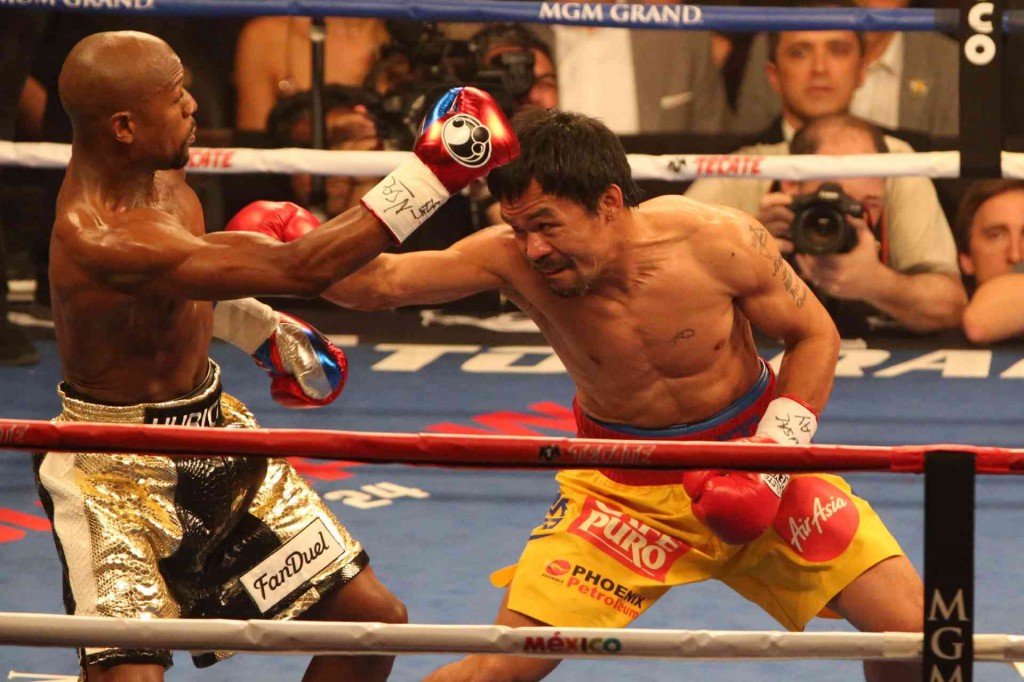
Manny Pacquiao (right) and Floyd Mayweather slug it out during the much-awaited event. From the match comes lessons businessmen may live by. REM ZAMORA
No doubt Filipino boxer Manny Pacquiao’s name will live on in boxing history as one of the world’s most revered fighters of his time. Pacquiao happens to be the first and only champion who holds the world titles in eight different weight divisions.
Floyd Mayweather Jr. is no pussy either, with five division world championships to date, and remains undefeated with 48 wins, zero losses and 26 knockouts.
Mayweather aims to bring his name alongside three other world champions with the most number of wins—heavyweight Rocky Marciano with 49 wins; miniflyweight Ricardo Lopez with 51 wins and bantamweight Jimmy Barry with 59 wins.
The title fight held on May 3 was a much-awaited event by boxing fans worldwide. It was also a match replete with marketing and branding lessons for businesses worldwide.
Here are some insights gleaned from the historic boxing match.
Leader vs challenger
The burden of proof on who dominates the field always lies with the challenger. So long as the leader continues to satisfactorily meet customers’ needs, specially loyal customers, the leader is likely to retain his position. The challenger then must outwit the leader.
To do so, a challenger must provide a differentiated yet relevant value offer to acquire the market leader’s legion of customers. This may mean offering a new benefit relevant to the customer or better ways of providing service—all resulting in a perception that the challenger has a superior offering over that of the leader.
In the case of Mayweather, nowhere in the 12-round match did his position become seriously precarious. Despite occasionally reeling from some powerful shots by Pacquiao, the latter’s punches were not sustained enough to steal the leadership position.
Throughout the fight, Mayweather maintained his dominance.
The same goes in business. A market leader’s position is constantly threatened, and even hurt by a challenger’s new product offering or changes in the macroenvironment. Yet a formidable market leader is expected to sustain his position.
Strategy, execution, reinvention
Serious market players pay equal attention to strategy and execution, rise up to the threats and opportunities, address weaknesses and fortify strengths.
Pacquiao is hailed as an innately gifted boxer analogous to a superior product in business.
However, in business, a superior product or service formula is just the first step. Having the right strategic positioning and execution is even more important for success. Strategies come in many ways, depending on the current market environment. Some of these include market expansion based on geography or new demographics, product reinvention responsive to new environmental needs and market demand, or a particularly memorable and impactful advertising campaign.
Famed trainer Freddie Roach is a stable staple in Pacquiao’s team. But his debilitating ailment may have been a handicap when snappy judgment calls and clear communications is called for inside the boxing ring.
With no complementary coach/trainer with the same winning skill as Roach, it is likely that Pacquiao relied on stock skills and knowledge in the most important battle of his career. So it is that boxing fans, most of them from Mayweather’s camp, saw nothing different from Pacquiao during the match—nothing out of the ordinary that could have converted them to Pacquiao’s camp.
Companies that continue to do the same things for decades, that do not recognize the changes in the environment, and are managed by decision-makers stuck in the past and unresponsive to change, are likely to be in a precarious situation.
Most global companies today have complementary strategists or expert consultants, alongside C-level managers, who will help them steer clear of these situations.
Different stories to tell
Pacquiao and Mayweather have different brand personalities and stories catering to the entertainment needs of customers.
Trash talker ‘moneyman’ Mayweather appeals to the physiological, functional needs of fans who are focused on a solid fight, stirred by Mayweather’s vulgar personality.
Pacquiao’s followers share the same motivation of a great fight. But a huge number of Filipino fans are inspired by his success story and how he has brought the country’s name from obscurity to world fame in the field of boxing.
In business, Mayweather caters to basic needs, while Pacquiao addresses the needs of customers generally inspired by ‘do good’ stories.
Pacquiao’s story has greater grit and may trigger deeper personal motivation to win at all costs.
Rise up to opportunities
French philosopher Voltaire once said, “present opportunities are not to be neglected, they rarely visit us twice.” Another visionary Thomas Edison states, “opportunity is missed by most people because it is dressed in overalls and looks like work.”
Pacquiao had that single chance to win over Mayweather’s boxing fans and assert his superiority. But to win over Mayweather means focus, no distractions, longer hours of training and possibly new ways of training and more investments in hiring expert staff.
Same with business, successful challengers who eventually became leaders never failed to make investments in R&D, expert advice and coaching, advertising and promotions, and were fiercely focused on the goal.
This is because successful challengers understand that victory results in far more opportunities.
With Pacquiao’s loss came the opportunity loss of millions worth of potential endorsement contracts, not to mention more than a hundred million dollars worth of rematch booty, a unified title belt and a chance to leave a greater legacy in the field of boxing.
The writer completed her MBA degree at the Ateneo Graduate School of Business and her doctoral degree at the De La Salle University. An alumnae of the Executive Education Program in Strategic Marketing at the Stanford Graduate School of Business, she is presently completing her Executive Education in Strategic Leadership at the Said Graduate School of Business, Oxford University in London. She is also chief brand strategist of MKS Marketing Consulting. Email at karenvdeasis@gmail.com

